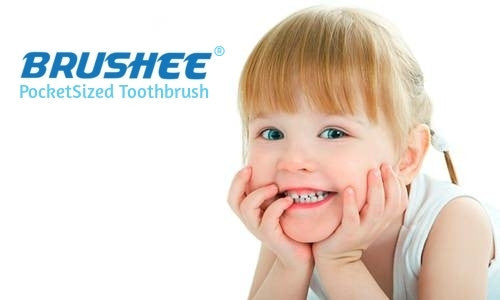![]()

Children's Oral Care Health
Share
Posted by Brushee Brand Publisher on May 25, 2016
Oral health is important in every stage of life, but perhaps its the most important when a person is still a child and is developing his or her adult teeth, and oral health care habits.
As most parents have come to realize, though, is that children often don't like to brush their teeth. In fact, they'd rather be sent to bed without dinner than have to face the dreaded tooth brush, but with some work and gentle encouragement, good oral health can become a routine-like clockwork.
Choosing The Right Toothbrush and Toothpaste
Good oral health starts with the toothbrush. Both manual and electric toothbrushes do the trick, but there are pros and cons to each, as well as different things to look for in each brush, and most parents choose to opt for manual brushes for their young children. When choosing a manual brush for your child, look for soft bristles that are rounded and gentle on the child's gums. Also, when choosing which brush to get your child, look for brushes that are specifically design for a child's small hands and mouth. This means the brush should have a smaller head, and a thicker handle to allow the child to grasp it without difficulty.
Most toothpastes on the market have fluoride. When swallowed, fluoride can case upset stomachs and contribute to dental fluorosis. To avoid these problems, look for children's tooth paste that does not list fluroide as an ingredient, and always supervise your child while he or she brushes. A good habit to get a child into is brushing and then rinsing his or her mouth out with water, before spitting it into the sink. This procedure gets rid of any extra fluoride.
First Checkup
Children should go to the dentist when the first tooth comes in. The dentist will check the child's teeth for an signs of decay, problems with bite, gums, or oral tissues, and if needed, the dentist or hygienist will clean the child's teeth.
Toothaches
Toothaches in a child are most often products of cavities and teething. It can be helpful to mix sea salt into a glass of warm water and have the child rinse his or her mouth out with the salt water- just try to avoid the salt water being swallowed. If the child's cheek or jaw is swollen from the toothache, place a cold compress (a frozen bag of peas wrapped in a towel works perfectly fine) on the area. If pain persists, take the child to the dentist as soon as possible.
Flossing
Flossing is the aspect of oral health that tends to get shoved under the rug, but it really is important. Flossing prevents plaque from building up between a child's teeth. If plaque build up becomes too severe the dentist will have to remove it manually. Plaque also builds up on the teeth, appearing as a layer of "peach fuzz" that can be felt when the tongue is run over the teeth. This fuzz is most noticeable when the teeth have not been brushed.
Flossing, if done in sync with teeth brushing, can easily become part of the drill. Despite the common belief that bleeding gums when flossing is normal, it isn't. It signals to dentists that an infection might be present, and can be the start of gum disease. Flossing at least once a day helps avoid bleeding gums and keep a child's mouth healthy.
Make Brushing Fun
If a child hates brushing, making a game out of it can be a life saver. Try singing the ABC'S while the child brushes, this way he or she can brush for a good amount of time and learn while doing it. Or, if the child likes dolls or action figures, bring the toy to the bathroom and have the child brush the toy's teeth before they brush their own. Alternatively, try using a toothpaste that appeals to the child- one that has characters on the front, tastes good, or is a cool color will get the child's attention and peak their interest.
A child's oral health isn't too much different from an adult's oral health. They're both important and need to be taken care of. In the case of a child's teeth, taking good care of their baby teeth will mean healthy adult teeth, and healthy adult teeth means less risk of oral disease.
